
Date: 2022-07-16 Visitcount: 86
In contemporary era, as children and youth spend more time indoors, exposure to nature becomes a fading natural experience, while COVID-19 pandemic has also affected their life to varying degrees. Online Exchange Program “Innovative Research on Children and Youth Education: Methods and Practice”, which consists of total 12 lectures, was held to show the latest thoughts and ideas of education for participants both inside and outside College of Education, Zhejiang University. After the previous wonderful sharing from Serkan UÇAN, Justin Dillon, and Alexandros Amplazis, there were another nine lectures successfully carried out in June and July.
In the fourth session, Dr. Shirin Hine from King's College London gave a lecture themed on “The potential of Forest School practice in England to support gender equity in environmental Education”. Dr. Hine explained “the Forest School” with its definition, development history and practice in English schools. The background of environmental education and gender, the methodology and her preliminary findings as well as project plan for the next step were presentedin sequence.
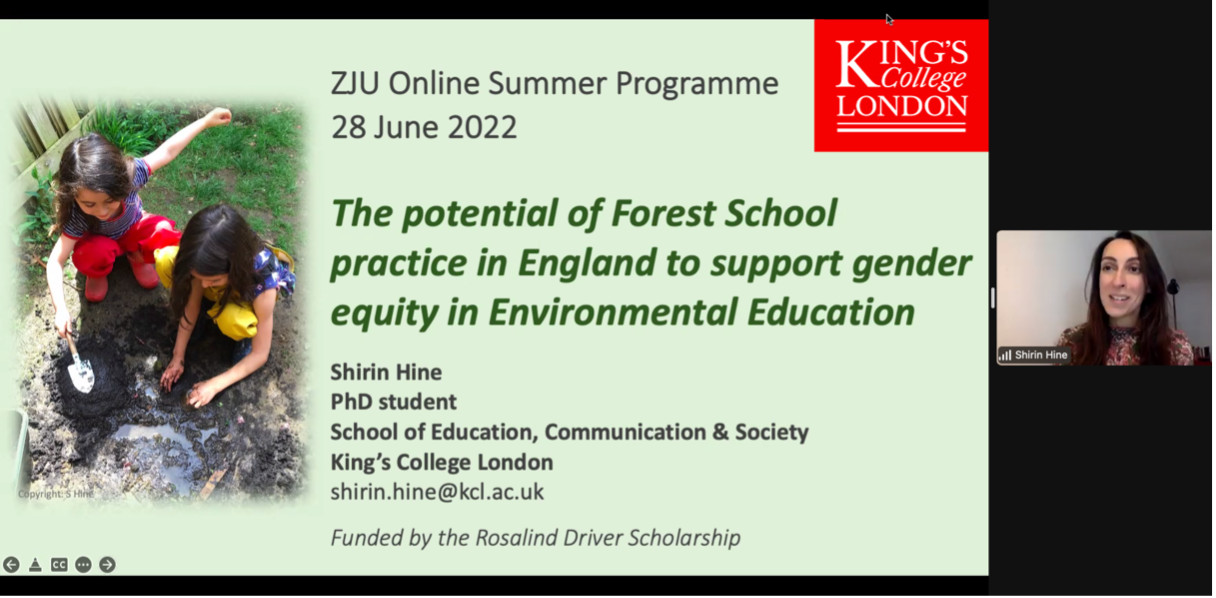
In the fifth session, Dr. Holli-Anne Passmore from Concordia University of Edmonton gave a lecture on “Nature-based wellbeing interventions: Simple, yet powerful”. Dr. Passmore firstly explained “why nature can impact on us” based on research results, and clarified Eco-existential Positive Psychology(E-EEP) framework, which includes elements like identity, death, isolation, freedom and meaning. She emphasized that it is the quality not quantity of the time spent in nature that does matter. Next, Dr. Passmore introduced the Character Strengths in Nature (CSiN), Three Good Thigs in Nature(3GTiN) as well as Noticing Nature Intervention (NNI). According to research on NNI, those who are exposed in nature are much happier, more satisfied with life, have greater feelings of elevation, and feel more connected and less stressed.
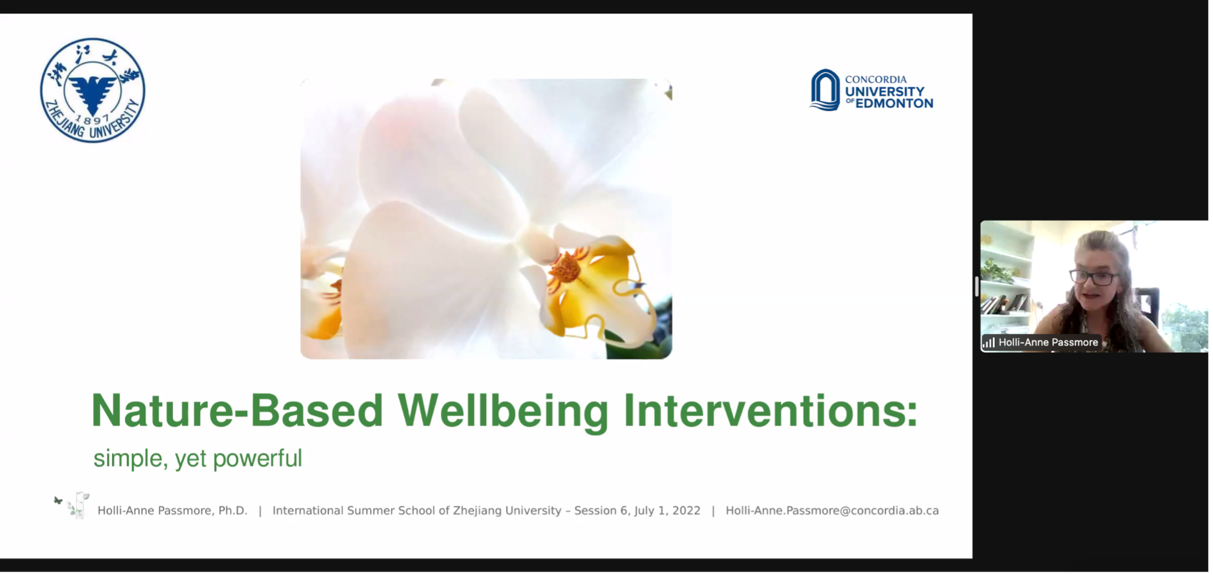
The sixth session was brought by Dr. Jie Gao from University of College London and Dr. Yuwei Xu from University of Nottingham jointly, aiming at “Understanding young children's perspectives on and experiences of COVID-19 in China and England”. Dr. Yuwei Xu firstly introduced their research background and theoretical framework, illustrated research purpose, selected participants and ethical considerations. Next, Dr. Jie Gao began to show a deeper insight by presenting a picture of initial findings. For example, Chinese children tended to describe the virus as giant monsters and show their strong will to beat the “monsters”, while British children tended to reveal their awareness of staying safe. Finally, a father whose child took part in the research was invited to show his feelings.
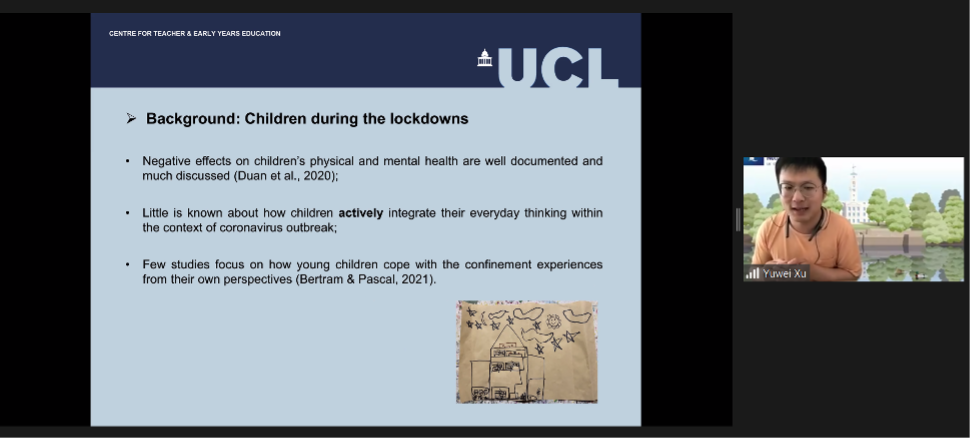
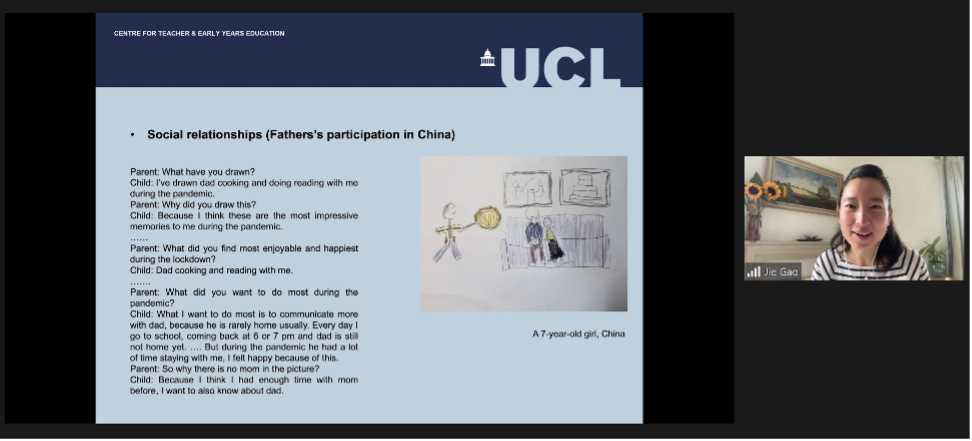
In the seventh session, Dr. Kate Hoskins of Brunel University, UK, gave a lecture on “Me, My Child and COVID-19: Parents' reflections on their child's experiences of lockdown in the United Kingdom (UK) and China”. Based on her own experience, Dr. Hoskins asked children to draw their experiences and impressions of COVID-19 with coresearchers (parents). This study fills the research gap on young children's perspectives and psychological processes in the context of COVID-19. The lecture showed great humanity, which helped us see children's unique and thought-provoking experiences under the COVID-19 pandemic.
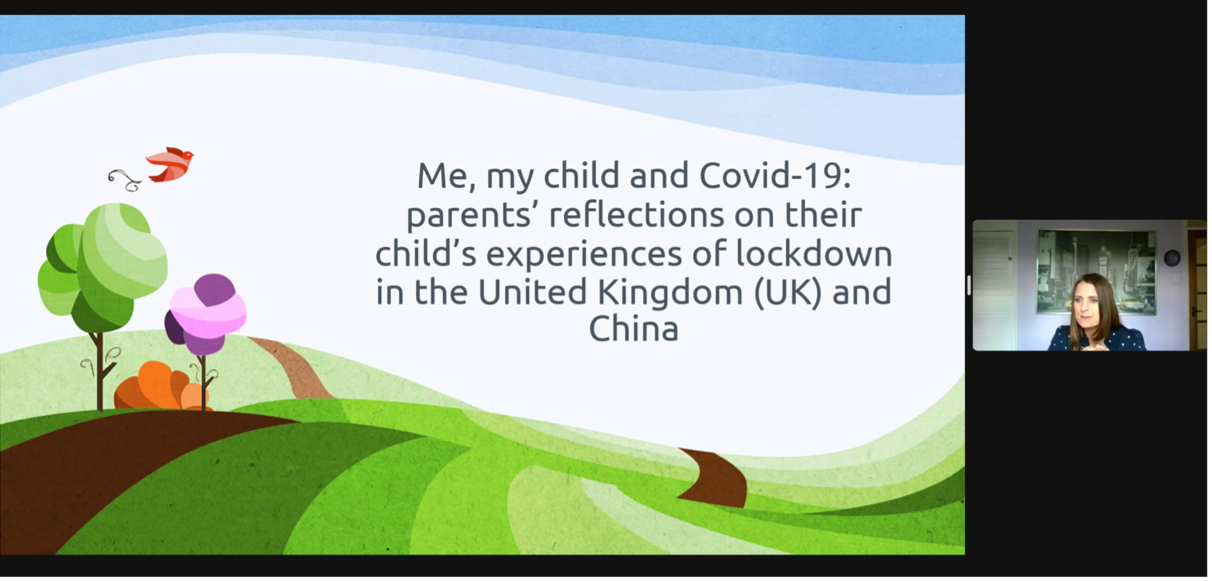
For the eighth session, Constadina Charalambous, Assistant Professor of European University Cyprus, delivered a lecture themed on “Translanguaging, social justice and ‘conflicted heritage’: challenges and possibilities”. After the literature review, Dr. Constadina rendered a brief explanation of the cultural context of Cyprus. The historical and cultural complexity and the language diversity made translanguaging pedagogies challenged, involving social issues such as justice, equity, and marginal population. Via an example from a highly diverse Greek-Cypriot primary school classroom and linguistic ethnographic data, the lecturer made an analysis of translanguaging pedagogies.
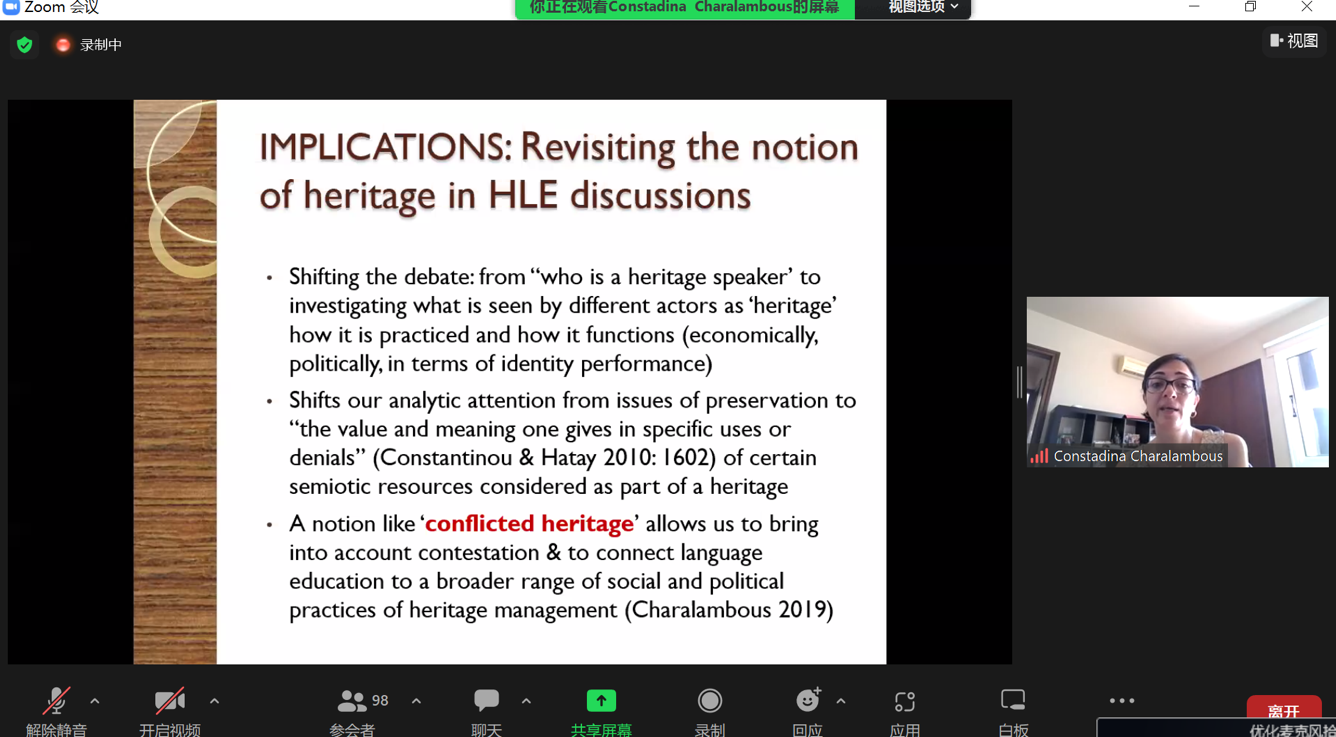
The nineth Session was wonderfully presented by Tingting Yuan, associate professor at University of Nottingham, entitled "Towards a critical cultural political economy account of the globalized higher education". From the current international context, Prof. Yuan mentioned that ongoing neoliberal globalization is still driving marketisation of education and COVID-19 pandemic significantly decreased international student mobility, countries and regions in East Asia became popular study destinations. The fact attracted much attention on global partnership, professional training and education, and so on, which simultaneously encouraged us to reflect on the existing norms, forms and politics of knowledge transfer in HE.
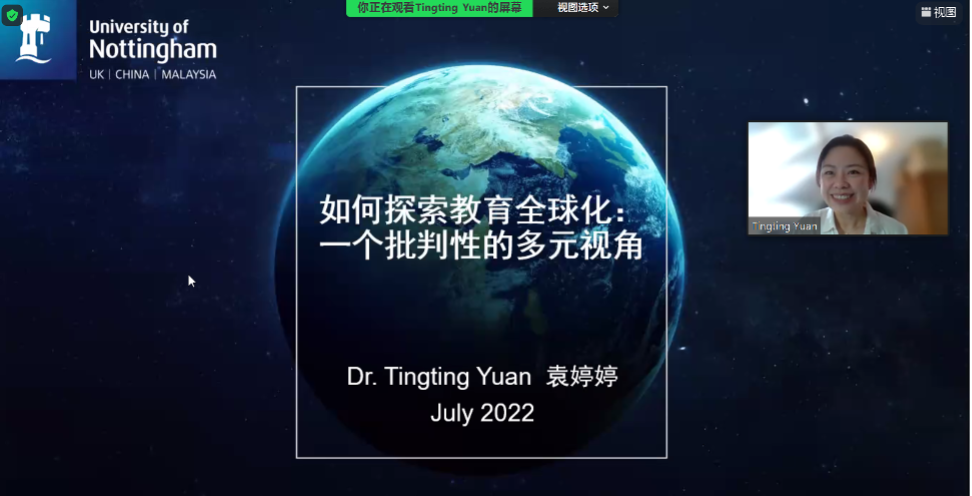
In the tenth session, Dr. Agnieszka Ewa Krautz, from the University of Mannheim in Germany, gave us the keynote speech entitled "Bilingualism, Emotion, and The Foreign Language Effect on Children". Her theme revolves around bilingualism, and in her opening remarks, she used interactive discussion many times to guide participants to think about the definition of "bilingualism". On the basis of solid conceptual clarification, she further explained the differences of bilinguals' moral choices, such as the choice transforms when facing classic moral dilemmas.
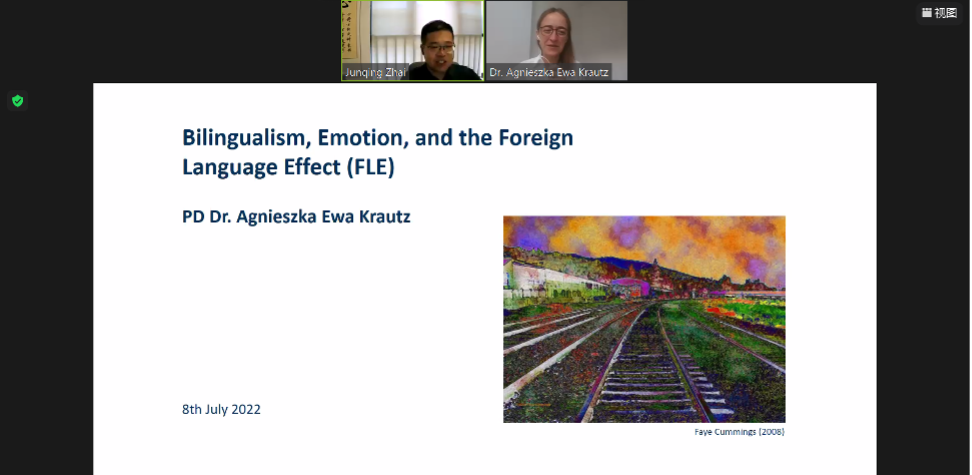
The eleventh session’s lecturer was Dr. Ye Cao, a doctoral student from King's College London, who focused on whether COVID-19 epidemic impressed students' engagement with science. Ye Cao compared the participation of Chinese and British students in science before and after the epidemic, found that although Chinese students obtained the world's leading position in mathematics and science of PISA before outbreak, their engagement intention on STEM or STEM-related fields were far lower than the world average. After outbreak, Chinese and British students had different experiences which led to different tendencies. For instance, inspired by the medical and healthcare workers, especially female ones, the willingness of students especially female students who tended to engage in medical science had been greatly enhanced. For British students, their purpose to throw into science was mainly to acquire knowledge to solve current epidemic problems. Interestingly, the epidemic had increased students' enthusiasm for scientific participation to a certain extent with respective intentions.
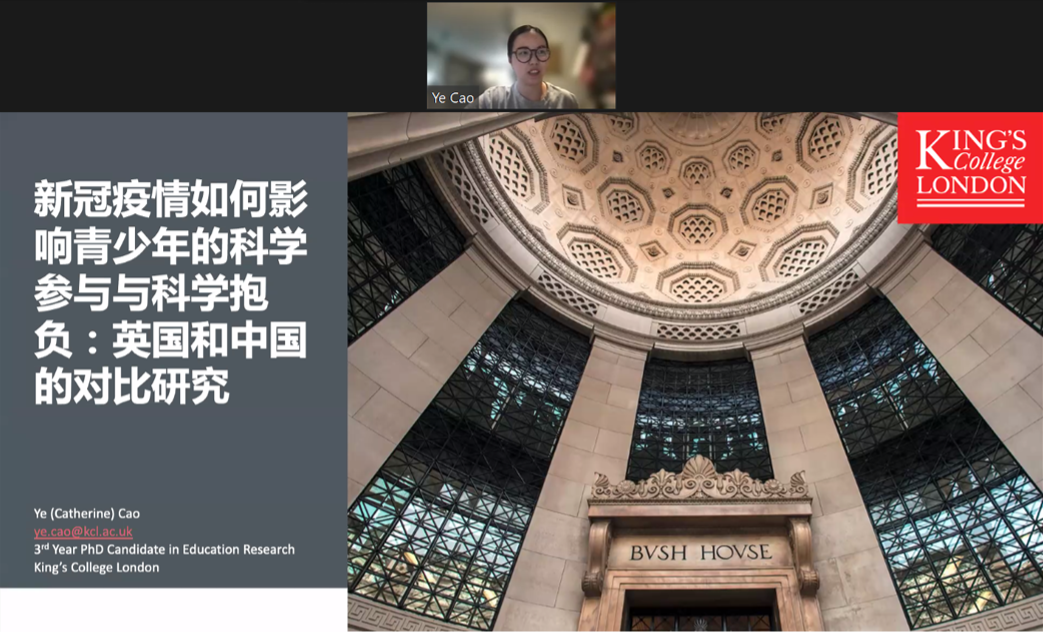
For the final session, Dr. Jo van Herwegen, associate professor at University College London, reported on mathematical development in children with neurodevelopmental disorders. It’s reported that people with Down syndrome (DS) and Williams syndrome (WS) had mathematical abilities impaired. However, it was unclear which domain-general or domain-specific abilities impact on mathematical development in these developmental disorders. Dr. Herwegen pointed mathematical abilities were delayed in line with overall mental age in DS and WS and visuospatial abilities predicted performance for DS and TD participants. These findings suggest that those with DS and WS may benefit from different mathematical intervention programs.
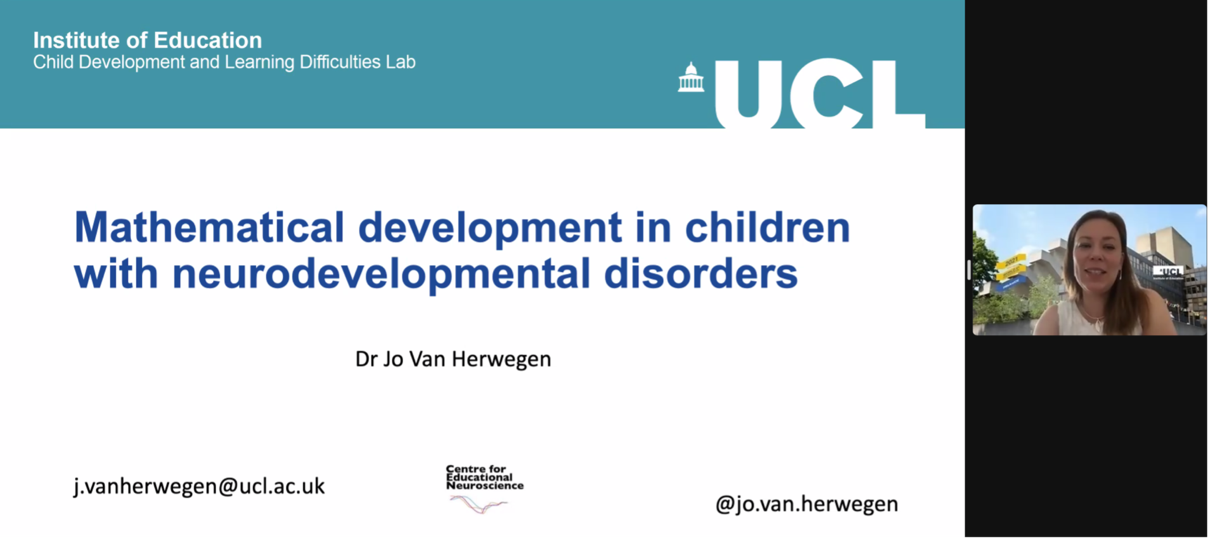
Improve and innovate the paradigm of international academic exchange, explore and expand the external learning accesses for students, College of Education is to build a new normal of international cooperation and exchange in the post-epidemic era, and continue to make every effort to ensure students' sense of gain. In half a month, participants gained new ideas, new methods and new perspectives on children and youth education research, with a deeper understanding of diverse education issues in the international context. Thank all the guest speakers, teachers and students for their support and affirmation of this international summer school!
Edited by YE Zi, HE Yexin, QIN Jiawei, LI Yan, XIA Jingyan
Photo taken by WANG Qiang

